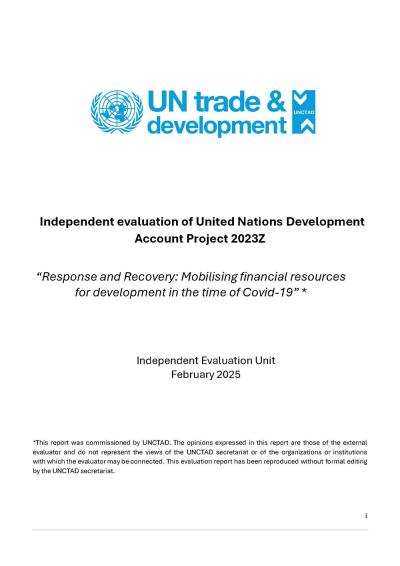
The "Response and Recovery: Mobilizing Financial Resources for Development in the Time of COVID-19" project was initiated following a UN General Assembly resolution in April 2020, which called for a global response to the pandemic's social, economic, and financial impacts.
Funded by the United Nations Development Account, the project involved collaboration among UNCTAD and three UN Regional Commissions: ECA, ECLAC, and ESCAP. The evaluation report uses OECD-DAC criteria—relevance, efficiency, effectiveness, sustainability, coherence, and inclusivity of gender, human rights, and disability considerations.
Background
The pandemic led to significant economic disruptions, with the IMF predicting a global contraction greater than the 2008-09 Financial Crisis. Middle- and low-income countries faced heightened vulnerabilities, including inflation, fiscal deficits, and increased debt distress. In response, the project aimed to enhance the capacity of Low-Income and Middle-Income Countries to diagnose financial vulnerabilities, design effective policies, and support recovery efforts.
Methodology
The evaluation employed a five-stage methodology, starting with a kick-off meeting and document review. The inception report was approved by an Evaluation Advisory Committee. During the document review, the evaluator categorized project knowledge outputs and conducted 24 semi-structured interviews with project staff.
Due to a low response rate from targeted interviewees, a survey was distributed to 76 workshop participants, with 25 responses received.
Findings
The project was highly relevant to the financial challenges faced by developing countries amid the pandemic. UNCTAD's long-standing focus on sustainable development supported the project’s objectives. It included ten workstreams addressing macro-financial stability, using tools like the Global Policy Model (GPM) and Financial Conditions Indicator (FCI) to help policymakers navigate both immediate and long-term impacts.
The Global Financial Safety Net (GFSN) Tracker also highlighted gaps in access to external financial resources. By introducing innovative financing instruments, macroprudential policies, and tax frameworks, the project supported sustainable recovery and enhanced domestic resource mobilization. The evaluation rated it as highly relevant across all workstreams.
Conclusion
The UNDA COVID-19 Response and Recovery Project was a timely initiative that tackled the macro-financial, fiscal, and debt challenges faced by developing countries during the pandemic. It produced valuable outputs, including research papers, toolkits, and webinars, which received positive feedback from stakeholders.
The project was executed efficiently within budget and utilized virtual methods effectively. Its internal coherence was evident in its collaboration with UNCTAD, ECLAC, ESCAP, and ECA, leveraging existing research for impactful outcomes.
Despite challenges in dissemination and resource constraints, the project significantly enhanced the capacity of developing countries to address macro-financial vulnerabilities, contributing to global sustainable development efforts.


